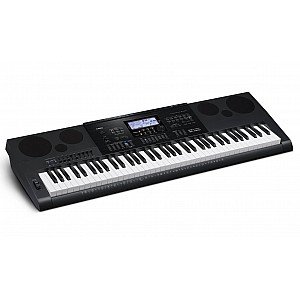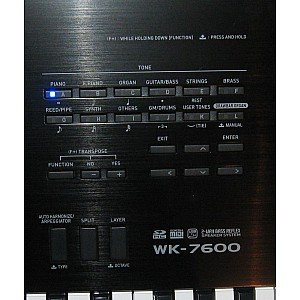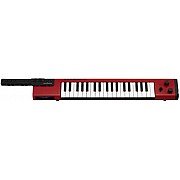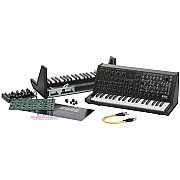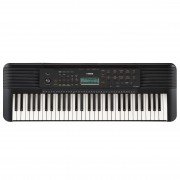 Senin-Jumat : 09.00 - 18.00 , Sabtu : 09.00 - 15.00 wib
Senin-Jumat : 09.00 - 18.00 , Sabtu : 09.00 - 15.00 wib -

BELANJA AMAN
TOKO RESMI BARANG ORIGINAL DAN BERGARANSI
-

PELAYANAN CEPAT
1 JAM TERKIRIM *
-

HUBUNGI KAMI
021-6501012 / 65306112
-

ALAMAT
JL.SUNTER MAS BARAT 1 BLOK H.9 NO.4 JAKARTA UTARA
Keranjang Belanja
0 item(s) - Rp.0,00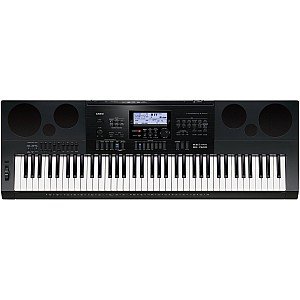
Spesifikasi Casio WK 7600
Casio WK 7600
Casio’s flagship WK-7500 delivers an unprecedented level of power and music-making capabilities in a highly affordable workstation. Along with high-quality sounds and a 17-track sequencer, the WK-7500 also has the ability to record audio. Even sounds from external instruments can be mixed and recorded. You can plug-in a microphone, guitar, bass, or other instruments, play along with instrument tracks within the WK-7500, and save to SDHC storage cards. Plus with included Data Manager software, you can mix down to a stereo WAV file. The WK-7500 also features large LCD display screens, nine physical sliders for mixing capabilities, and an organ drawbar mode.
Multi-track Recorder Capabilities:
The Song Sequencer provides 16 tracks plus one system track that supports recording of up to five songs and a total of approximately 30,000 notes. Each individual musical instrument part can be recorded to a different track for real multi-track recording capabilities. In addition to real-time recording of keyboard and Auto Accompaniment play, the Song Sequencer also supports punch-in and punch-out spot recording of specific parts of a song, and event-editing lets you edit recorded data note-by-note. A full selection of editing tools include event insert, event delete, event copy, quantize, a locator feature for selecting the range of notes to be edited, and more. A step-recording function also lets you input notes by specifying the length and pitch. Completed recordings can be converted to SMF (Standard MIDI File) format and stored to an SD memory card.
32-channel Mixer:
Nine sliders, one for each channel, can be used for individual simultaneous adjustment of volume, pan, reverb send, and other parameters. Sound input from an external source via the MIC IN terminal and INST IN terminal can also be adjusted as desired.
.
Pattern Sequencer:
Up to eight tracks (drum, percussion, bass, chord 1 through chord 5) can be edited to create original accompaniment patterns (Intro, Normal, Normal Fill-in, Variation, Variation Fill-in). In addition to recording over each individual accompaniment part of an existing rhythm, and event editing function gives you total control over each aspect of recorded data, an Easy Edit function lets you combine accompaniment from multiple built-in rhythms to create original rhythms, and mixer capabilities give you control over the tones, volume levels, reverb, and other parameters of each part. A full selection of editing tools include event insert, event delete, event copy, quantize, and more. Memory is provided for storage of up to 100 different user rhythms, which can be recalled with the touch of a key.
Audio Recording and Playback:
Keyboard play, Auto Accompaniment, Song Sequencer play, and sound input via the Inst In and/or Mic In terminals can be recorded as digital audio data to an SD memory card inserted in the card slot for later playback. Of course, you can play along on the keyboard during playback from an SD memory card (not included). Saved audio files can also be transferred to a computer connected via USB for long-term storage. Special Data Manager 6.0 application software, downloadable from Casio’s website, can be used to convert data to WAV format, which can be played back on a computer. All of this greatly simplifies the task of creating original demo recordings.
* Note: To perform the operations described above, you will need to obtain an SD memory card or SDHC memory card with a capacity between 2GB and 32GB.
(See #485547).
Multiple Digital Effects
Built-in effects include reverb (10 types), chorus (five types), and DSP (100 types using 46 effect types including delay, phaser, flanger, wah, rotary, and more). You can apply different effects to a tone to create exactly the sound you want. By adjusting the parameters of the DSP effect types, you can create original DSP effects and store up to 100 original types in memory for later recall.
* Note: DSP and chorus cannot be used simultaneously
.
Drawbar Organ Function:
50 specially selected, often-used preset drawbar settings come built-in. A few simple operations produce a digital reproduction of powerful, deep drawbar organ sound that is the dream of every keyboardist. A rotary speaker is simulated using a built-in DSP for the distinctive sound effect of drawbar organ speakers. Like a drawbar organ, nine sliders can be used to change harmonic overtone level settings and to create sounds by adding a harmonic percussion effect in real time as you play. You can edit the parameters of the distinctive percussion effect and click sound of a drawbar organ to create original drawbar organ tones, and save up to 50 of your creations in memory for later recall.
Registration—A Tool For Live Performances:
A simple operation saves the current setup, including tone, rhythm, and other settings for instant recall when you need them. The WK-7500 has 6 sets x 16 banks for saving 96 setups. You even can save tones that effector effects are being applied to. Recalling a registration instantly changes the digital keyboard's setup, making this a great tool for live stage performances.
Tone Editor:
Tone Editor can be used to adjust attack time, release time, cutoff, vibrato, reverb, chorus, DSP, and other parameters as desired. You can create distinctively original tones for performances and music creation sessions.
Arpeggiator:
With the arpeggiator, you can play various arpeggios and other phrases automatically by simply pressing keys on the keyboard. You can select from 150 different arpeggiato types, including playing arpeggios from a fingered chord, guitar phrases, and more.
SD Memory Card Slot:
Song sequencer, pattern sequencer, tone editor, and other data can be saved to an SD or SDHC memory card. An Audio Record function can be used to record digital audio data. SMF (Standard MIDI File) data stored on an SD or SDHC memory card can be played back on the digital keyboard.
Input/Output Terminals:
Different input/output terminals are provided to meet a variety of different needs: line out terminals (L/MONO, R) for connection of the mixer of a stage PA system or other devices, an INST IN terminal and a MIC IN terminal for connection of a musical instrument or microphone, an audio in terminal (AUDIO IN) for audio device input that can be output through the speakers, and more.
USB Port:
The USB port provides easy computer and MIDI send/receive connection. It also enables quick and simple transfer of song sequencer, pattern sequencer, tone editor and other data, as well as audio data recorded to an SD memory card from an audio device between the digital keyboard and a computer. Download of a special Data Manager 6.0 application is required in order to transfer data to a computer.
AHL Sound Source:
The sound source is pre-programmed with digital samples of acoustic musical instruments recorded using the most advanced digital technology. Thanks to CASIO original sound technology, the AHL sound source is capable of reproducing all of the natural smoothness of the original waveform. The AHL sound source delivers a lineup of 800 different built-in tones. You also can store up to 100 of your own original tones for instant recall whenever you need them.
250 Preset Rhythms and Auto Accompaniment:
A total of 250 preset rhythms cover a wide range of musical genres, from rock and pops, to jazz, Latin, piano pieces, and more. Simply select the built-in rhythm you want and Auto Accompaniment provides you with backup that is the next best thing to having a professional band at your disposal.
Sliders and Large Dial:
Nine sliders are provided for drawbar organ settings and mixer operations. A large operation dial really comes in handy during music creation using sequencer functions and mixer functions.
Display:
The display shows the currently selected tone name and rhythm name, along with a wealth of other information. On the sequencer screen, for example, you can check the current status and volume level of each of the 16 tracks, and other setting information at a glance.
Piano-Style Keyboard and Touch Response:
The keyboard is designed and engineered to provide a realistic piano experience. Just like a grand piano keyboard, Touch Response causes sound that is output to change in accordance with the amount of pressure applied to the keys.
High-output 2-Way Bass Reflex Speakers:
A 7W+7W high-output bass reflex 2-way 4-speaker system delivers rich sound from low range to high. The speakers can be used as high-quality monitoring speakers during performances and music creation sessions.
Pitch Bend Wheel and Modulation Button:
The pitch bender wheel makes it easy to add realistic sounding guitar choking, sax bending, and other effects to keyboard play. This in combination with the modulation button for applying vibrato and other effects puts a wide range of playing versatility at your fingertips.
Music Presets:
Music presets provide one-touch access to Auto Accompaniment, tone, reverb, and other settings that are configured in accordance with representative chord progressions. A total of 305 presets let you easily configure the keyboard for a wide variety of different musical styles. In addition to built-in presets, you can create your own original presets (user presets) and store them in memory for later recall.
Features
- Piano-style keyboard and touch response
- 800 factory tones and 100 user tones
- 250 preset rhythms and auto-accompaniment
- 17-channel song sequencer records up to 5 songs (30,000 notes)
- Audio recording and playback on SD/SDHC memory card
- 32-channel mixer
- Pattern sequencer
- Multiple digital effects
- Drawbar organ function
- Save up to 96 performance setups
- Tone editor
- Arpeggiator
- SD memory card slot
- AHL sound source
- 9 sliders and large operation dial
- USB port
- Input/Output terminals
- Display
WK-7500 76-Key Digital Keyboard Workstation Specifications:
- 76 piano-style keys
- Touch Response (2 sensitivity levels, off)
- 64-note polyphony (maximum)
- 800 built-in tones (including 50 drawbar organ tones)
- 250 rhythms including 106 ethnic rhythms and 20 patterns for piano play
- Pattern sequencer
- Auto-accompaniment
- Music Preset (305 presets) with chord progression, chord edit
- Registration (16 banks x 6 sets for 96 setups)
- One-Touch Preset (250 presets)
- Drawbar organ function
- Digital effects: Reverb 10 types, chorus 5 types (Simultaneous use with DSP not supported), DSP 100 preset / 100 user (Simultaneous use with chorus not supported)
- Metronome
- Auto Harmonize (12 types)
- Arpeggiator (150 types)
- MIDI: 16-channel multi-timbre received, GM level 1 standard
- Amplifier: 7W + 7W
- Size (W x D x H): 46-3/4 x 15-11/16 x 5-7/8 (1,187 x 399 x 149 mm)
- Weight: 19.6 lb. (8.9 kg)
- Batteries: D-size x 6 (Not Included)
- AC adaptor: AD-A12150LW
Casio WK 7600
Spesifikasi Casio WK 7600
Casio WK 7600
Casio’s flagship WK-7500 delivers an unprecedented level of power and music-making capabilities in a highly affordable workstation. Along with high-quality sounds and a 17-track sequencer, the WK-7500 also has the ability to record audio. Even sounds from external instruments can be mixed and recorded. You can plug-in a microphone, guitar, bass, or other instruments, play along with instrument tracks within the WK-7500, and save to SDHC storage cards. Plus with included Data Manager software, you can mix down to a stereo WAV file. The WK-7500 also features large LCD display screens, nine physical sliders for mixing capabilities, and an organ drawbar mode.
Multi-track Recorder Capabilities:
The Song Sequencer provides 16 tracks plus one system track that supports recording of up to five songs and a total of approximately 30,000 notes. Each individual musical instrument part can be recorded to a different track for real multi-track recording capabilities. In addition to real-time recording of keyboard and Auto Accompaniment play, the Song Sequencer also supports punch-in and punch-out spot recording of specific parts of a song, and event-editing lets you edit recorded data note-by-note. A full selection of editing tools include event insert, event delete, event copy, quantize, a locator feature for selecting the range of notes to be edited, and more. A step-recording function also lets you input notes by specifying the length and pitch. Completed recordings can be converted to SMF (Standard MIDI File) format and stored to an SD memory card.
32-channel Mixer:
Nine sliders, one for each channel, can be used for individual simultaneous adjustment of volume, pan, reverb send, and other parameters. Sound input from an external source via the MIC IN terminal and INST IN terminal can also be adjusted as desired.
.
Pattern Sequencer:
Up to eight tracks (drum, percussion, bass, chord 1 through chord 5) can be edited to create original accompaniment patterns (Intro, Normal, Normal Fill-in, Variation, Variation Fill-in). In addition to recording over each individual accompaniment part of an existing rhythm, and event editing function gives you total control over each aspect of recorded data, an Easy Edit function lets you combine accompaniment from multiple built-in rhythms to create original rhythms, and mixer capabilities give you control over the tones, volume levels, reverb, and other parameters of each part. A full selection of editing tools include event insert, event delete, event copy, quantize, and more. Memory is provided for storage of up to 100 different user rhythms, which can be recalled with the touch of a key.
Audio Recording and Playback:
Keyboard play, Auto Accompaniment, Song Sequencer play, and sound input via the Inst In and/or Mic In terminals can be recorded as digital audio data to an SD memory card inserted in the card slot for later playback. Of course, you can play along on the keyboard during playback from an SD memory card (not included). Saved audio files can also be transferred to a computer connected via USB for long-term storage. Special Data Manager 6.0 application software, downloadable from Casio’s website, can be used to convert data to WAV format, which can be played back on a computer. All of this greatly simplifies the task of creating original demo recordings.
* Note: To perform the operations described above, you will need to obtain an SD memory card or SDHC memory card with a capacity between 2GB and 32GB.
(See #485547).
Multiple Digital Effects
Built-in effects include reverb (10 types), chorus (five types), and DSP (100 types using 46 effect types including delay, phaser, flanger, wah, rotary, and more). You can apply different effects to a tone to create exactly the sound you want. By adjusting the parameters of the DSP effect types, you can create original DSP effects and store up to 100 original types in memory for later recall.
* Note: DSP and chorus cannot be used simultaneously
.
Drawbar Organ Function:
50 specially selected, often-used preset drawbar settings come built-in. A few simple operations produce a digital reproduction of powerful, deep drawbar organ sound that is the dream of every keyboardist. A rotary speaker is simulated using a built-in DSP for the distinctive sound effect of drawbar organ speakers. Like a drawbar organ, nine sliders can be used to change harmonic overtone level settings and to create sounds by adding a harmonic percussion effect in real time as you play. You can edit the parameters of the distinctive percussion effect and click sound of a drawbar organ to create original drawbar organ tones, and save up to 50 of your creations in memory for later recall.
Registration—A Tool For Live Performances:
A simple operation saves the current setup, including tone, rhythm, and other settings for instant recall when you need them. The WK-7500 has 6 sets x 16 banks for saving 96 setups. You even can save tones that effector effects are being applied to. Recalling a registration instantly changes the digital keyboard's setup, making this a great tool for live stage performances.
Tone Editor:
Tone Editor can be used to adjust attack time, release time, cutoff, vibrato, reverb, chorus, DSP, and other parameters as desired. You can create distinctively original tones for performances and music creation sessions.
Arpeggiator:
With the arpeggiator, you can play various arpeggios and other phrases automatically by simply pressing keys on the keyboard. You can select from 150 different arpeggiato types, including playing arpeggios from a fingered chord, guitar phrases, and more.
SD Memory Card Slot:
Song sequencer, pattern sequencer, tone editor, and other data can be saved to an SD or SDHC memory card. An Audio Record function can be used to record digital audio data. SMF (Standard MIDI File) data stored on an SD or SDHC memory card can be played back on the digital keyboard.
Input/Output Terminals:
Different input/output terminals are provided to meet a variety of different needs: line out terminals (L/MONO, R) for connection of the mixer of a stage PA system or other devices, an INST IN terminal and a MIC IN terminal for connection of a musical instrument or microphone, an audio in terminal (AUDIO IN) for audio device input that can be output through the speakers, and more.
USB Port:
The USB port provides easy computer and MIDI send/receive connection. It also enables quick and simple transfer of song sequencer, pattern sequencer, tone editor and other data, as well as audio data recorded to an SD memory card from an audio device between the digital keyboard and a computer. Download of a special Data Manager 6.0 application is required in order to transfer data to a computer.
AHL Sound Source:
The sound source is pre-programmed with digital samples of acoustic musical instruments recorded using the most advanced digital technology. Thanks to CASIO original sound technology, the AHL sound source is capable of reproducing all of the natural smoothness of the original waveform. The AHL sound source delivers a lineup of 800 different built-in tones. You also can store up to 100 of your own original tones for instant recall whenever you need them.
250 Preset Rhythms and Auto Accompaniment:
A total of 250 preset rhythms cover a wide range of musical genres, from rock and pops, to jazz, Latin, piano pieces, and more. Simply select the built-in rhythm you want and Auto Accompaniment provides you with backup that is the next best thing to having a professional band at your disposal.
Sliders and Large Dial:
Nine sliders are provided for drawbar organ settings and mixer operations. A large operation dial really comes in handy during music creation using sequencer functions and mixer functions.
Display:
The display shows the currently selected tone name and rhythm name, along with a wealth of other information. On the sequencer screen, for example, you can check the current status and volume level of each of the 16 tracks, and other setting information at a glance.
Piano-Style Keyboard and Touch Response:
The keyboard is designed and engineered to provide a realistic piano experience. Just like a grand piano keyboard, Touch Response causes sound that is output to change in accordance with the amount of pressure applied to the keys.
High-output 2-Way Bass Reflex Speakers:
A 7W+7W high-output bass reflex 2-way 4-speaker system delivers rich sound from low range to high. The speakers can be used as high-quality monitoring speakers during performances and music creation sessions.
Pitch Bend Wheel and Modulation Button:
The pitch bender wheel makes it easy to add realistic sounding guitar choking, sax bending, and other effects to keyboard play. This in combination with the modulation button for applying vibrato and other effects puts a wide range of playing versatility at your fingertips.
Music Presets:
Music presets provide one-touch access to Auto Accompaniment, tone, reverb, and other settings that are configured in accordance with representative chord progressions. A total of 305 presets let you easily configure the keyboard for a wide variety of different musical styles. In addition to built-in presets, you can create your own original presets (user presets) and store them in memory for later recall.
Features
- Piano-style keyboard and touch response
- 800 factory tones and 100 user tones
- 250 preset rhythms and auto-accompaniment
- 17-channel song sequencer records up to 5 songs (30,000 notes)
- Audio recording and playback on SD/SDHC memory card
- 32-channel mixer
- Pattern sequencer
- Multiple digital effects
- Drawbar organ function
- Save up to 96 performance setups
- Tone editor
- Arpeggiator
- SD memory card slot
- AHL sound source
- 9 sliders and large operation dial
- USB port
- Input/Output terminals
- Display
WK-7500 76-Key Digital Keyboard Workstation Specifications:
- 76 piano-style keys
- Touch Response (2 sensitivity levels, off)
- 64-note polyphony (maximum)
- 800 built-in tones (including 50 drawbar organ tones)
- 250 rhythms including 106 ethnic rhythms and 20 patterns for piano play
- Pattern sequencer
- Auto-accompaniment
- Music Preset (305 presets) with chord progression, chord edit
- Registration (16 banks x 6 sets for 96 setups)
- One-Touch Preset (250 presets)
- Drawbar organ function
- Digital effects: Reverb 10 types, chorus 5 types (Simultaneous use with DSP not supported), DSP 100 preset / 100 user (Simultaneous use with chorus not supported)
- Metronome
- Auto Harmonize (12 types)
- Arpeggiator (150 types)
- MIDI: 16-channel multi-timbre received, GM level 1 standard
- Amplifier: 7W + 7W
- Size (W x D x H): 46-3/4 x 15-11/16 x 5-7/8 (1,187 x 399 x 149 mm)
- Weight: 19.6 lb. (8.9 kg)
- Batteries: D-size x 6 (Not Included)
- AC adaptor: AD-A12150LW
Tulis review
Nama Anda:Review Anda:
Note: HTML tidak diterjemahkan!
Rating: Jelek Bagus
Masukkan kode verifikasi berikut:


